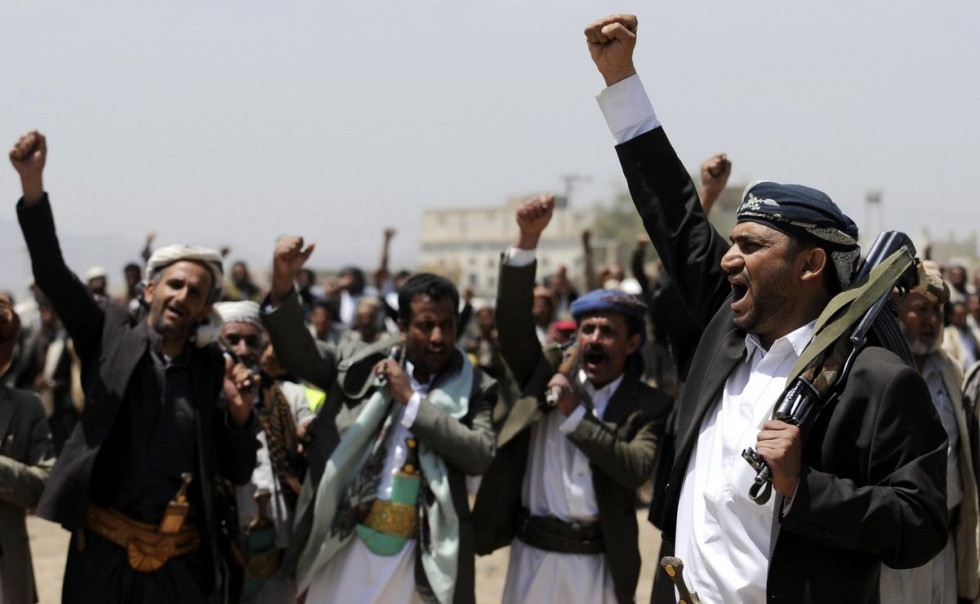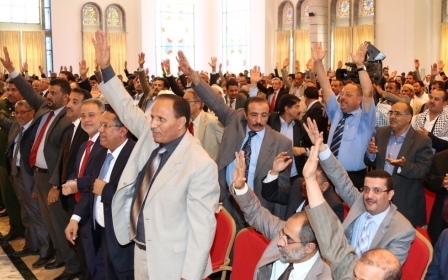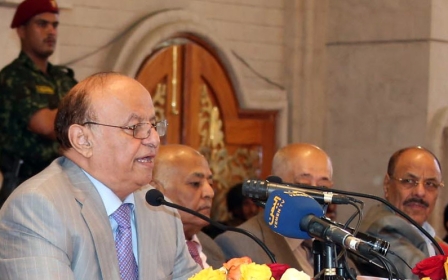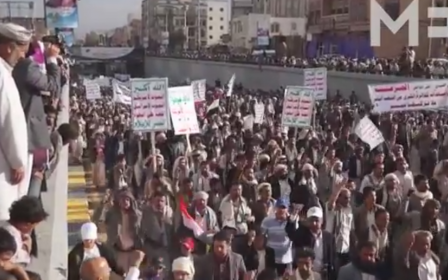Yemen’s ‘blessed revolution’ edges towards a showdown

AL MUKALLA, YEMEN - An attempt by Yemen’s president to defuse tensions with a mass Houthi-led protest movement quickly fell apart on Tuesday, with the group rejecting his offer to dismiss the government, reinstate fuel subsidies and tackle corruption.
Abd Rabbu Mandour Hadi had made the proposal on Tuesday afternoon, accepting a new initiative proposed by political forces that aimed to ease the rising tensions.
A Houthi spokesperson quickly rejected the proposed concessions in a post on his Facebook page.
"Our stand is with the people who have sparked a blessed revolution with legitimate and just demands,” said Mohammad Abdullsallam. “We reject any attempt that seeks to dilute or circumvent the popular demands of the Yemeni people."
Hailing from northern Yemen, the Shiite Houthi rebels have been staging massive rallies in Sana’a and other cities over the past two weeks, demanding the resignation of the government and a reversal of a fuel price hike in July that saw prices nearly double from US$0.58 a litre to US$0.93.
The rebels, also known as the Ansarullah (supporters of God), have blocked streets and erected encampments in the vicinity of ministries and the capital's main airport, sparking competing rallies by government supporters.
Hadi signalled in his speech that he may use armed forces to quell the dissident if his proposal failed. "We emphasize that you must raise your combat readiness and stay on constant vigilance and high morale." he said to the country's military.
Short-lived pledge
Under the initiative, Hadi would have named a new prime minister and ministers of defence, interior, foreign affairs and finance within a week. The other ministers would be chosen based on the nominations of participating political parties. Hadi also said he would have cut back the fuel price increase by about 30%.
The new government formed by Hadi would also have reviewed all economic, financial and monetary policy, have considered raising the minimum wage and taken measures to address corruption.
In exchange for this, the rebels would need to end hostilities in the north as well as halt protests in the capital.
Crucially, this would involve pulling out of the province of Amran and easing fighting with army troops and tribesmen in the province of Jawf.
Stalemate
Shortly after the beginning of the Houthi protests, Hadi sent a committee formed of leading partisan and non-partisan figures to negotiate with the rebels in their stronghold, Saada. But after more than 20 hours of talks, the committee came back to the capital without a deal.
Abdul Malik al-Mikhalafi, the committee's spokesperson, said on his Facebook page that the Houthis had proposed that the fuel subsidies decision be postponed for two months.
The group also demanded a rethink of a six-region federal system that was introduced after the end of transitional talks in February.
Obstacles to reform
Analysts are sceptical about the ability of the new government to enact major changes, especially on corruption. The caretaker government was formed in 2012 in response to a peace deal brokered by the six Gulf states that officially ended former president Ali Abdullah Saleh’s regime, with Saleh's party and an opposition coalition named the Joint Meeting Parties (JMP) sharing the seats.
Abdul Bari Taher, a veteran political analyst, told Middle East Eye that the new government would not succeed since ministers would be chosen based on their political affiliations.
Taher said that the outgoing government failed because ministers brought their own political agendas to the cabinet.
"The ministers' allegiance was to their parties, not the country. This initiative would reproduce the same [failed] government," he said.
Taher speculated that the proposed cut in fuel prices would not bring down prices of commodities – a major rallying cry for the protestors - since prices are not monitored in the country.
Political tensions have been high in Yemen since the price rise was announced on 29 July, which also saw the cost of diesel increase from $0.47 to $0.88 per litre.
Taher said that the government would need to stand up to sections of the political elite is it genuinely wanted to tackle corruption. "Those powerful people take commission from oil revenues, own agencies and possess the wealth of the nation. Those people are the source of the problems and must be removed."
Confrontation and expansion
The Houthi movement is named after its founder, Hussien al-Houthi, who was killed in clashes with government in 2004. The province of Saada, northern Yemen, has been at the centre of six deadly wars between the government and the Houthis since then.
The rebellion was sparked in 2004 when government forces stormed the area to capture al-Houthi for allegedly challenging the central government. The wars ended in 2010 after both sides agreed to hold talks.
The government has accused the rebels of plotting to establish a separate Shiite state in northern Yemen that would reinstate a dynasty that was overthrown in the 1960s. The rebels deny the accusations, saying that they opposed the government only to seek more autonomy for their Zaydi sect and curb the US involvement in Yemen affairs.
For years, tensions between the government and Houthis existed only in some cities in the province of Saada. That is, until the last days of Saleh’s regime in early 2011.
As Saleh was struggling to keep his grip on power, the Houthis began to strengthen their position in the province. Strained relationships with their rival Sunni Salafis intensified when Houthi forces besieged a multinational religious school in the village of Dammaj in December 2011.
The rebels said that the school had become a recruiting hub for jihadists who had incited hatred against Shiites in the area. The blockade lasted for months and was only lifted after the students agreed to leave the school and live in Sana'a.
After completely asserting their control in Saada, the Houthis moved to the neighbouring province of Amran, where local affiliate tribes had been fighting a fierce battle against the national army and fighters loyal to the Sunni Islah party.
The fighting continued for months, with the rebels finally defeating their opponents on 7 July and seizing a large stash of ammunition. Again, the rebels said that their supporters had revolted against what they described as “oppression” of Shiites by some elements of the Islah party.
The clashes spread over to other provinces in the north like Jawf, Mareb and Dhamar. The fiercest continuing battles are in two districts in Jawf province, where hundreds of families have been forced to flee their homes.
Taher says that Hadi and his government should use peaceful means to convince the Houthis to come back to the fold.
"Neither the Yemenis nor the international community would accept dragging the president dragging the country into more fighting."
New MEE newsletter: Jerusalem Dispatch
Sign up to get the latest insights and analysis on Israel-Palestine, alongside Turkey Unpacked and other MEE newsletters
Middle East Eye delivers independent and unrivalled coverage and analysis of the Middle East, North Africa and beyond. To learn more about republishing this content and the associated fees, please fill out this form. More about MEE can be found here.




